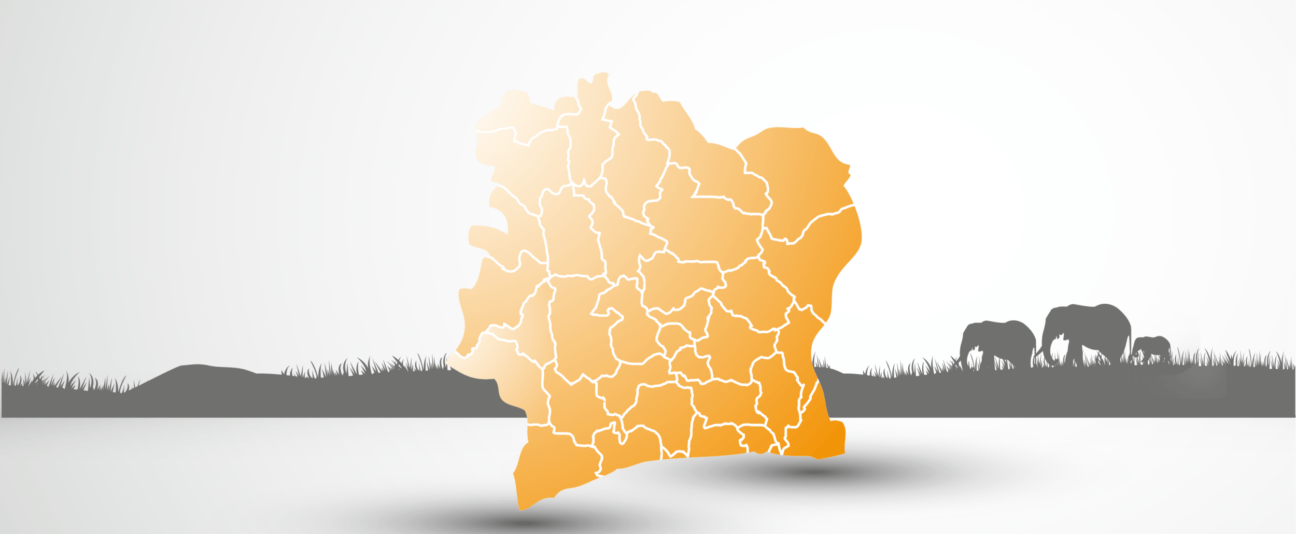
Pillar 3
Region, living and investment environment
The third pillar of Côte d’Ivoire Solidaire is the creation of a pleasant living environment and an attractive investment environment in each of our regions. This will involve strengthening the competitiveness of our regions by creating a more favourable business environment and high-quality economic infrastructure. This will also enable every Ivorian to continue to enjoy better living conditions throughout Côte d’Ivoire.
OUR KEY MEASURES :
3.1- REGIONAL ECONOMIC AND SOCIAL DEVELOPMENT
- Effective implementation of the programme to develop competitive economic clusters and secondary towns ;
- Creating the conditions that enable companies to effectively identify the regions or cities where they can generate the best economic returns;
- Creation of the Guichet Unique Intersectoriel or Resource Centre, to facilitate access to technical and financial information and provide the necessary assistance to companies established or wishing to establish themselves in the regions;
- Continued development of industrial estates in the regions ;
- Improving mechanisms to increase the collection of local taxes;
- Deepening and institutionalising mechanisms for collaboration between regions and municipalities.
3.2 – ECONOMIC INFRASTRUCTURE
Transport
- Extension of the tarmac road network, linking all the departmental capitals with all-weather roads;
- Relaunching the development and extension of the rail network;
- Design, financing and operation of the new San-Pédro international airport;
- Strengthening the capacity of port infrastructures to support the policy of increasing the volume of trade between Côte d’Ivoire and the rest of the world;
- Strengthening Air Côte d’Ivoire and developing the airport to consolidate Abidjan’s position as an airport hub;
- Improving traffic flow ;
- Increasing multimodal transport services, in particular lagoon transport in Abidjan.
Electricity
- Electrification of all localities in Côte d’Ivoire by the end of 2025 to increase the coverage rate to 100%;
- Continuation of the Electricity For All Programme (PEPT), which will provide 200,000 households a year with access to electricity for vulnerable groups;
- Continued extension of the electricity network in areas already electrified;
- Accelerating the development of renewable energies in line with the commitments made at COP-21;
- Increasing production capacity and the quality of the electricity generated, in order to consolidate our position as a sub-regional hub.
Drinking water
- Continuation of the Water For All Programme to build 200 complete urban water systems in 200 sub-prefectures in Côte d’Ivoire;
- Securing resources for drinking water supply ;
- Rehabilitation of human hydraulic infrastructures ;
- Drinking water supply for non-sub-prefecture localities with between 4,000 and 5,000 inhabitants.
3.3 – LIVING ENVIRONMENT
Hygiene and sanitation
- Improving people’s living conditions (sanitation, hygiene, etc.) ;
- Continuing efforts to ensure sustainable management of solid and liquid waste and hazardous waste, in order to provide people with a healthy living environment;
- Continuing to organise the collection, transport and treatment of solid household and similar waste in towns;
- Development of a genuine plastic waste processing industry.
Access to accommodation
- Acceleration of social housing construction programmes in urban and rural areas;
- Setting up a programme to secure land reserves and provide services, with a view to accelerating housing development;
- Setting up financing solutions for households to access housing;
- Introduction of new procedures and regulations to ensure land regularisation and the application of town planning rules;
- Speeding up procedures for registering and securing land titles.
3.4 – ENVIRONMENTAL PROTECTION
- Strengthening the institutional and regulatory framework of the environment sector
- Strengthening the human capacity of environmental management structures;
- Raising public awareness of environmental protection issues;
- Strengthening biodiversity conservation ;
- Building capacity to adapt to and mitigate the effects of climate change ;
- Strengthening green industries and sustainable development;
- Strengthening sustainable environmental protection;
- Disaster risk reduction ;
- Pollution prevention and control.